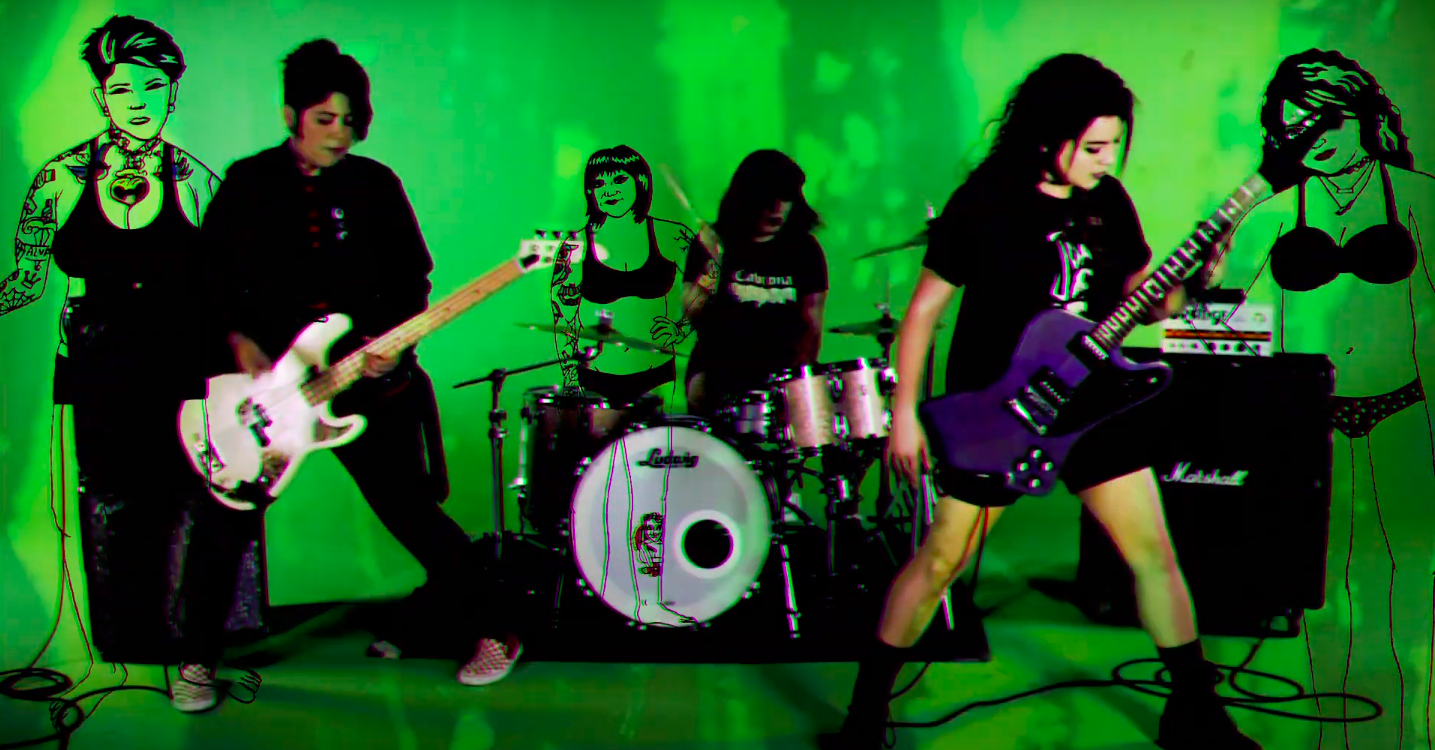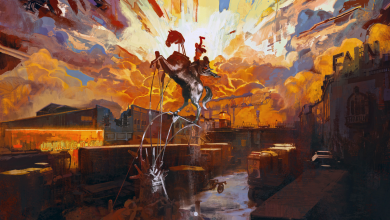A (Brief) Alternative History of Punk

Image source: YouTube
Punk rock is often told as a white man’s history. When, on rare occasion, that narrative is expanded, it often centers the white women of the scene. But, if you look closely, you see that women, particularly women of color, have always been and continue to be a driving force of the genre and its broader subculture. Punk is about being fed up, yes, but it’s also about creating spaces for marginalized communities to have their voices heard and identities validated. Punk rejects the mainstream, instead advocating for a DIY ethic and non-conformist stance, because the mainstream is largely a product of white cultural hegemony. It calls for alternatives to society and it rejects the status quo–whether that be political, social, cultural, or economic—because its artists are just bold and angry enough to envision something better for themselves.
This particular playlist looks at important mile-markers in the evolution of punk rock, and it doubles as a re-telling and re-centering of the subculture’s history. From the mid-1970s to the immediate present, we can see the music and the scene transform from a white man’s game to a powerful vision of revolution led by those who have long resided in the margins.
“Rip Her To Shreds,” Blondie (1976)
“Red eye shadow, green mascara! Yuck, she’s too much!”
Blondie may now be more associated with new wave or even disco, yet they were there at the beginning of the scene playing New York gigs alongside bands like The Ramones. Debbie Harry, Blondie’s frontwoman, subverted stereotypes of femininity in her own personal style just as she does on this track off the band’s debut album. Here, Harry recites a series of sexist, gossip-column-esque criticisms of women not to endorse them, but rather to skewer the media’s constant urge to shame women for their every choice.
“Identity,” X-Ray Spex (1978)
“Do you see yourself on the TV Screen? Do you see yourself in the magazine?”
As a Black woman in a scene dominated by white men, Poly Styrene of X-Ray Spex offered a vital feminist perspective to the UK’s first wave of punk. When Styrene burst onto the scene alongside acts like The Clash and the Sex Pistols, she was still a teen with braces on her teeth. But she was already well-attuned to the nuances of identity politics and angered by the capitalist, consumerist ideals sold to her generation. Some forty years later, the track feels as relevant as ever as Styrene protests a lack of representation and resists mainstream media’s attempts to render her invisible.
“I Must Not Think Bad Thoughts,” X (1983)
“My planes, my guns, my money, my soldiers. My blood on my hands, it’s all my fault”
By their fourth album, the essential Los Angeles punk outfit X had moved away from their early aggressive tracks and into a rockabilly-inspired sound. And they also grew more political, mostly taking aim at Reagan-era conservatism. This particular track confronts the American middle-class’s inherent privilege of being apolitical and their own complicitness in American imperialism abroad.
“Me Gusta Ser Una Zorra,” Vulpes (1983)
“I’d rather masturbate in my bed by myself than sleep with someone who wants to talk about tomorrow”
Vulpes was short-lived, breaking up a year after they formed, but they cast a long shadow of infamy. Their televised performance of this track—which translates to “I like being a whore”—sparked national controversy over censorship in their home country of Spain. Though the band endured legal difficulties, protests, and eventual dissolution after the release of this song, it remains a powerful celebration of female sexuality and a rejection of all forces that seek to control it.
“Ms. 45,” L7 (1988)
“You fuck with her, she’ll blow your ass away”
Somewhere between the rise of grunge and the advent of the Riot Grrrl movement, L7 emerged with their own aggressive, explicitly feminist sentiments. “Ms. 45” is the perfect product of a band always concerned with their place in a society that offers them no justice. Calling for militant action against would-be assailants, L7 here puts power back in the hands of women that culture dismisses as “whore[s].”
“No Fucking War,” 7 Year Bitch (1992)
“Silence is defeat”
With lines like “Bush, pull out like your father should have,” 7 Year Bitch stands out as both extremely funny and remarkably prescient. The track doesn’t even pass the 2-minute mark, but every second bursts with political rage and conviction. This was written in fierce opposition to the Gulf War and George H.W. Bush, but its anti-war message remains easily applicable across decades—and presidents—to come.
“White Boy,” Bikini Kill (1993)
“I’m so sorry if I’m alienating some of you, your whole fucking culture alienates me”
The Riot Grrrl movement, helmed by Bikini Kill’s frontwoman Kathleen Hanna, was not without its problems. The visible members of the scene tended in large part to be cis, white, middle-class women, and the contributions of queer artists and/or women of color were largely ignored. The movement did, at the very least, attract a wider audience to the punk scene and brought more mainstream attention to the anti-patriarchy sentiments like those heard on this track.
“What Are Little Girls Made Of,” Spitboy (1995)
“I am your second-class citizen”
An essential hardcore Bay Area band, Spitboy were contemporaries of the riot grrrls, but drummer Michelle Cruz Gonzales explicitly distanced herself and the group from the movement. As a Xicana artist in a predominantly white scene, Gonzalez endured racism and classism, but the band never failed to inject the culture with a healthy dose of anarchic politics. Spitboy’s essentially feminist spirit can be clearly heard on this song, blunt and concise as it is revolutionary.
“Modern Girl,” Sleater-Kinney (2006)
“Anger makes me a modern girl”
Sleater-Kinney, founded by Carrie Brownstein of Portlandia fame, have always been punk more so in spirit than in sound. A seminal Riot Grrrl act, they offer as much revolution as any of their noisier counterparts. This track uncovers a deep-rooted disillusionment at the heart of late-stage-capitalist modernity, and its image of a stifling consumer culture remains as haunting as ever.
“No Means No,” Alice Bag (2016)
“You stupid fuck! No means no!”
Alice Bag and her band the Bags were on the Los Angeles punk scene at its outset. Featured prominently in Penelope Spheeris’ quintessential (and fascinating) documentary Decline of Western Civilization, Bag herself has always been a tireless advocate for Xicana rights and representation. About exactly what the title would suggest, this song off her later solo album exists proudly at the intersection of rage and justice.
“Mujer Moderna,” Fea (2016)
“No soy sola, no soy perra, solo soy mujer” / “I’m not alone, I’m not a bitch, I’m just a woman”
The San Antonio-based band has only been together since 2014, but they’ve already collaborated with Alice Bag herself and even garnered praise from punk legend Iggy Pop. As they gain more mainstream attention, they remain dedicated to the rebellion against marginalization and to the celebration of intersectional identities. A spiritual cousin to Sleater-Kinney’s “Modern Girl,” this track takes the best of Riot Grrrl rage and improves on it with a bold inclusivity.
“All Bosses are Bastards,” Material Support (2019)*
“I give you my labor, my blood, sweat, and tears. You don’t bother to pay me a living wage.”
Material Support only relatively recently exploded onto the New Yark hardcore scene, and they’ve done so with an unfaltering vision of anti-imperialist revolution. Attorney and lead singer Jackie Mariano offers her music both as PSA’s to teach audiences their rights and as anthems of rebellion. This class-conscious track proves that punk, as much as the scene has transformed over the years, is always rooted in the present, loudly protesting the injustices of its own cultural moment.
*Material Support is not available on Spotify, but you can stream all their music on their bandcamp: https://materialsupport.bandcamp.com/track/all-bosses-are-bastards-abab




